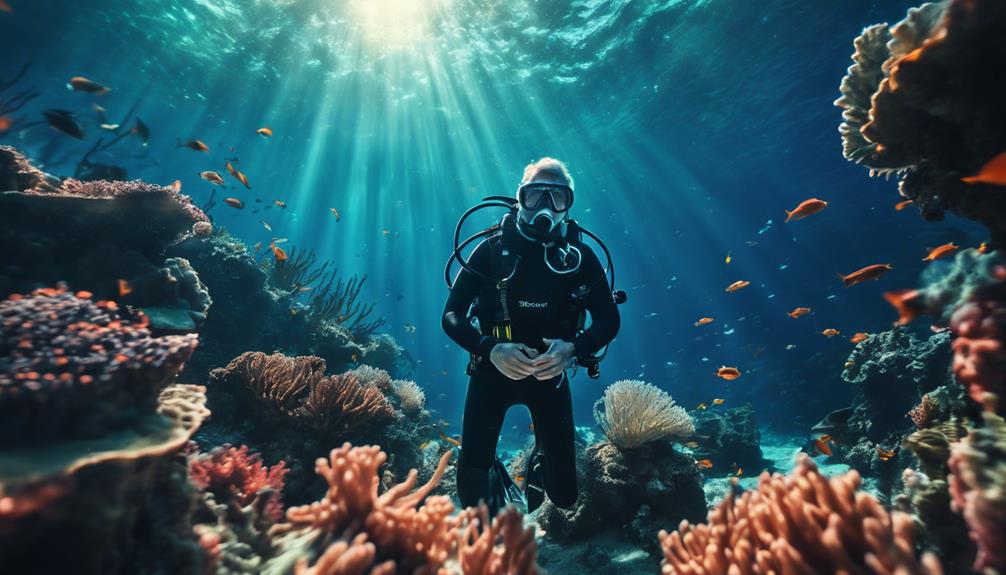Don Walsh's explorations have redefined our understanding of the ocean's depths. As the first human to reach Challenger Deep, he made a historic dive that revealed unique deep-sea ecosystems. His work, including over 200 publications, has greatly influenced marine science and policy. After earning a PhD in oceanography, he served as Dean of Marine Programs, advocating for sustainable practices and ocean conservation. Walsh's persistent dedication inspires future generations to explore and protect the ocean. If you want to uncover more about his remarkable achievements and their impact, just look a bit deeper into his groundbreaking work.
Background Information
Understanding Don Walsh's journey starts with his Navy service and studies in oceanography, which laid the groundwork for his remarkable discoveries.
You'll see how he became the first human to reach Challenger Deep, marking a monumental moment in exploration.
His efforts not only advanced deep-sea research but also sparked initiatives that continue to influence oceanographic studies today.
Navy Service and Oceanography Studies
Don Walsh's Navy service provided him with invaluable experience in submarines, which laid the groundwork for his groundbreaking studies in oceanography. As a U.S. Navy officer, he commanded the USS Bashaw (SSKS-241), where he honed his skills in underwater navigation and marine engineering. This hands-on experience not only deepened his comprehension of ocean environments but also inspired his passion for exploration.
After retiring from the Navy, Walsh pursued further education, earning a PhD in oceanography from Texas A&M University. This academic achievement solidified his expertise and allowed him to contribute greatly to marine science. He later joined the University of Southern California as a professor and eventually became the Dean of Marine Programs. There, he initiated the USC Institute for Marine and Coastal Studies, focusing on critical marine policy and ocean research.
Throughout his career, Walsh published over 200 works on marine exploration and history, considerably influencing future generations of oceanographers and engineers. His unique blend of military experience and academic knowledge has made him a pivotal figure in the field of oceanography, shaping the way we comprehend and explore the ocean.
First Human to Reach Challenger Deep
On January 23, 1960, Captain Walsh and Jacques Piccard made history as the first humans to reach Challenger Deep, plunging into the depths of the Mariana Trench. They descended in the bathyscaphe Trieste, a vessel specially designed to withstand the crushing pressures found at such extreme depths. As they approached 9,000 meters, they heard a significant bang, which raised concerns about the integrity of their craft.
Despite the unsettling noise, they continued their descent and finally reached the ocean floor at a staggering depth of 10,916 meters (35,814 feet). Once there, Walsh and Piccard spent about 20 minutes exploring the alien environment, but visibility was limited due to stirred-up sediment and a cracked acrylic window. Their brief stay in Challenger Deep provided invaluable insights into the geological and biological conditions of the deep-sea ecosystem.
This remarkable achievement not only showcased human ingenuity but also opened the door for future deep-sea exploration. Walsh reached a milestone that would inspire generations of scientists and explorers to investigate the mysteries of the ocean's depths.
Deep-Sea Exploration Initiatives
The groundbreaking expedition to Challenger Deep marked the beginning of a new wave of deep-sea exploration initiatives that have since expanded our understanding of the ocean's depths.
On January 23, 1960, Captain Don Walsh and Jacques Piccard made history by descending to the bottom of the Mariana Trench in the bathyscaphe Trieste. This remarkable journey revealed the extreme conditions at such depths, reaching nearly 11 kilometers below sea level.
The Trieste was ingeniously designed to withstand over 1,000 times the atmospheric pressure found at these depths, showcasing human ingenuity in exploring the unknown. Despite experiencing technical difficulties, including a cracked window, Walsh and Piccard spent about 20 minutes observing the seafloor. Their findings provided invaluable insights into the unique ecosystems thriving in the dark, high-pressure environment of the trench.
Since that historic dive, deep-sea exploration has evolved, with both manned and unmanned missions venturing into the ocean's depths. These initiatives continue to reveal the mysteries of the Mariana Trench and beyond, paving the way for a deeper understanding of marine life and the geological processes that shape our planet.
Current Updates or Main Focus
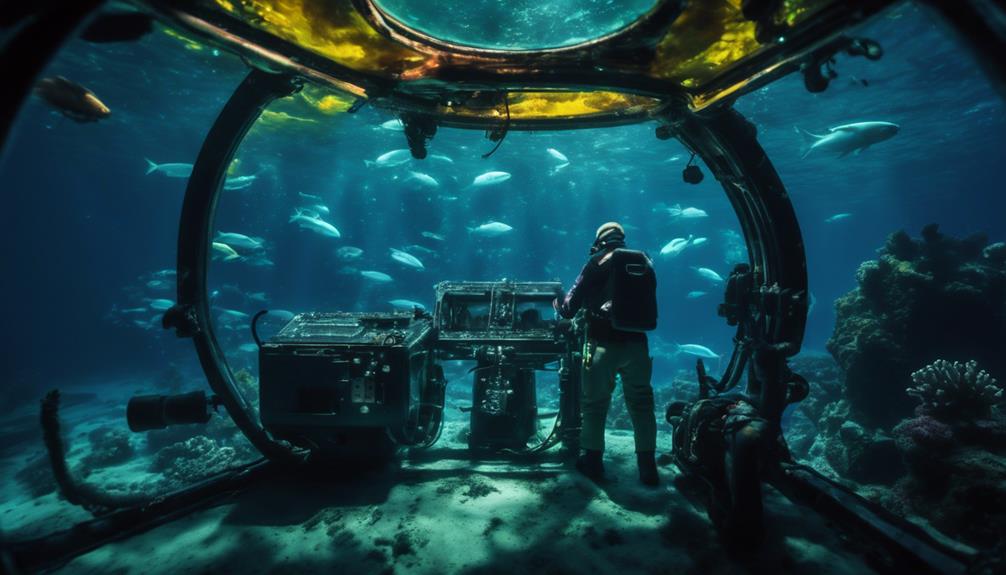
As you explore the latest advancements in deep-sea robotics, you'll see how innovation is reshaping ocean exploration.
You'll also notice a significant shift towards environmental advocacy, highlighting the urgent need for ocean conservation initiatives.
These efforts not only honor Don Walsh's legacy but also pave the way for a sustainable future in marine research.
Deep-Sea Robotics Innovation Efforts
Current efforts in deep-sea robotics are pushing the boundaries of exploration by enhancing autonomous underwater vehicles (AUVs) and remotely operated vehicles (ROVs) to reach uncharted ocean depths. These innovations are essential for studying the deepest parts of the ocean, like the Mariana Trench, which plunges nearly 11 kilometers down. Advances in artificial intelligence and machine learning are allowing these vehicles to collect and analyze data more effectively than ever before.
Institutions like the Ocean Exploration Trust and Ocean Infinity collaborate on projects that integrate robotics into ocean exploration, aiming to map vast, largely uncharted areas of the ocean floor. Recent developments have led to hybrid vehicles that combine the best features of AUVs and ROVs, providing greater versatility for deep-sea missions. These vehicles can conduct detailed geological surveys and biological sampling, which are indispensable for understanding the ecological significance of ocean trenches.
As researchers push forward, they're fueled by the need to grasp how these deep-sea ecosystems influence global climate systems. With each innovation, robots continue to play a pivotal role in gathering the essential data necessary for scientific research and conservation efforts.
Transition to Environmental Advocacy
Don Walsh's shift to environmental advocacy underscores his commitment to protecting marine ecosystems and raising awareness about the essential role of ocean conservation. After retiring from the Navy, he dedicated himself to highlighting the importance of marine exploration and the deep-sea environment. Walsh's work emphasizes the need for robust understanding and protection of our oceans, especially the often-overlooked ocean trenches that play a critical role in Earth's climate and biodiversity.
He's published over 200 works that investigate the intricacies of marine ecosystems, advocating for increased ocean literacy and research funding. This focus aims to inspire future generations to take action in ocean conservation.
Walsh also warns about the potential risks associated with deep-sea exploration, pushing for rigorous safety testing of submersibles before missions. His advocacy work reflects a belief that safe and responsible exploration can lead to meaningful insights into our oceans, promoting a deeper appreciation for their fragility.
Through his efforts, you can see how Walsh has transformed from an explorer to a passionate guardian of the seas, encouraging all to recognize the urgent need for conservation in this critical yet vulnerable environment.
Ocean Conservation Initiatives
Numerous ocean conservation initiatives are gaining momentum, focusing on protecting marine ecosystems and addressing significant threats like pollution and climate change.
As you explore these efforts, you'll find that organizations are increasingly raising awareness about the dire state of our oceans. Don Walsh has been a key figure in these initiatives, advocating for the preservation of biodiversity and the importance of healthy marine habitats.
His contributions extend to promoting sustainable practices in the maritime sector, encouraging businesses to adopt eco-friendly technologies. By doing so, Walsh aims to inspire others to join the fight against overfishing and harmful pollution.
Education plays a substantial role in these initiatives, with outreach programs designed to engage young minds and foster a new generation of ocean conservationists.
In addition, Walsh emphasizes the need for research into ocean trenches, which are essential for understanding global climate systems. These deep-sea ecosystems play a significant role in carbon cycling, and studying them is crucial for developing effective conservation strategies.
As you consider the future of ocean conservation, remember that every effort counts in protecting our planet's marine ecosystems for generations to come.
Detailed Analysis
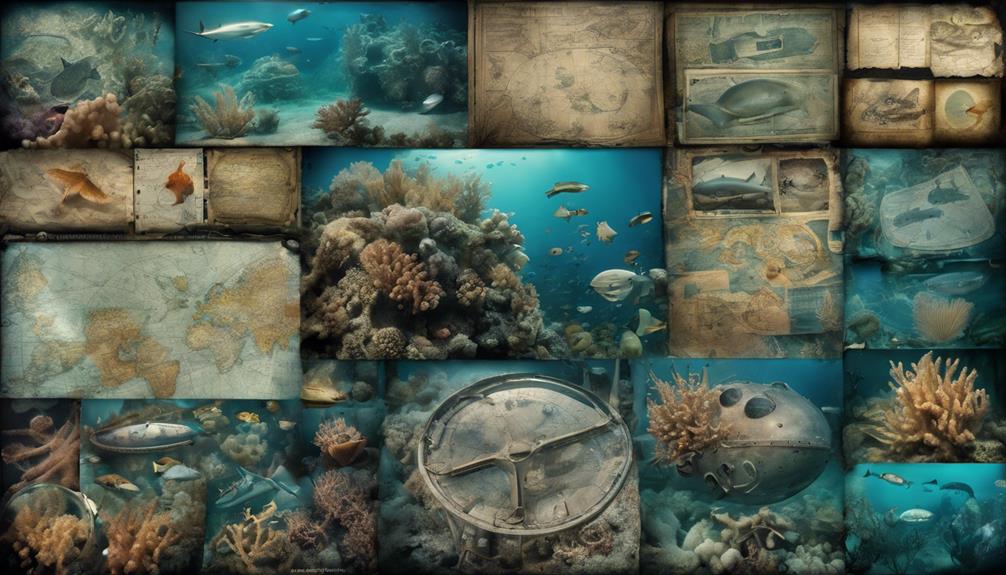
As you explore the impact of Don Walsh's historic journey, you'll see how recent deep-sea expeditions have built on his legacy. The development of advanced submersible technology and research vessels has allowed scientists and explorers to venture even further into the depths of the ocean, building on the explorer’s feats. These expeditions have led to the discovery of new species, the mapping of underwater geological features, and the study of unique ecosystems that were previously inaccessible. Thanks to Don Walsh’s pioneering journey, the mysteries of the deep sea continue to be unveiled, leaving a lasting legacy in the world of ocean exploration.
These missions not only contribute to our understanding of marine life but also spark important debates around marine policy.
You might find that this ongoing exploration fuels your own passion for the mysteries of the ocean.
Recent Deep-Sea Expeditions
Recent advancements in deep-sea exploration technology have transformed how researchers study the ocean's depths, revealing new insights into its ecosystems and geological formations. For instance, Victor Vescovo's DSV Limiting Factor made headlines in 2019 by reaching Challenger Deep, the deepest point in the ocean. This milestone marked significant progress in deep-sea exploration, paving the way for further investigations.
The 2020 Five Deeps Expedition, also led by Vescovo, aimed to explore the deepest points of all five oceans, yielding valuable data on previously uncharted deep-sea ecosystems. In 2021, the Ocean Exploration Trust's ROV Doc Ricketts contributed to this growing body of knowledge by discovering new species and mapping unexplored underwater terrains.
The 2022 expedition to the Mariana Trench focused on microbial life and human impacts on these fragile environments, underscoring the urgent need for conservation efforts. With innovations like high-definition cameras and robotic arms, researchers can collect data and observe phenomena like never before.
These recent deep-sea expeditions not only advance scientific understanding but also emphasize the importance of protecting our ocean's depths for future generations.
Influence on Marine Policy Debates
Don Walsh considerably influenced marine policy debates by advocating for the integration of ocean conservation principles into discussions surrounding deep-sea ecosystems. His role as Dean of Marine Programs at the University of Southern California allowed him to shape educational curricula that emphasized sustainable practices. You'd find it impressive how he contributed to over 200 publications, many targeting the implications of deep-sea exploration and resource extraction.
Walsh was particularly vocal about the risks associated with deep-sea mining, stressing the urgent need for regulatory frameworks to protect these fragile environments. He didn't just write about these issues; he actively engaged in discussions that brought attention to the necessity of protecting marine biodiversity.
His mentorship of aspiring oceanographers and engineers created a ripple effect, empowering a new generation to challenge existing marine policy and advocate for ocean health.
Thanks to his efforts, the dialogue around marine policy has shifted, placing a stronger emphasis on conservation. This influence is essential as human activities continue to encroach on deep-sea ecosystems, making Walsh's work more relevant than ever in today's policy landscape.
Exploration Fuels My Passion
Exploring the depths of the ocean has always fueled my passion for discovery and understanding the intricate ecosystems that thrive beneath the waves. My historic dive to the Challenger Deep in 1960 was a turning point, reaching a staggering 10,916 meters (35,814 feet) and showcasing human resilience. This deep-sea expedition ignited my commitment to exploration, as I realized the importance of firsthand experiences in revealing the mysteries of our oceans.
Throughout my career, I've participated in numerous deep-sea missions, collaborating with explorers like James Cameron and Victor Vescovo. Each mission deepened my understanding and passion for marine science, emphasizing the need for ocean literacy. As a mentor and educator, I endeavor to inspire future generations to appreciate the significance of deep-sea exploration.
Moreover, my work in ocean engineering reflects my dedication to advancing technology that guarantees the safety of future explorations. I believe that exploration isn't just about discovery; it's about protecting and understanding the invaluable resources beneath the surface. In every dive, I'm reminded of the vast mysteries still waiting to be uncovered, fueling my passion for exploration anew.
Public Reaction or Expert Opinions
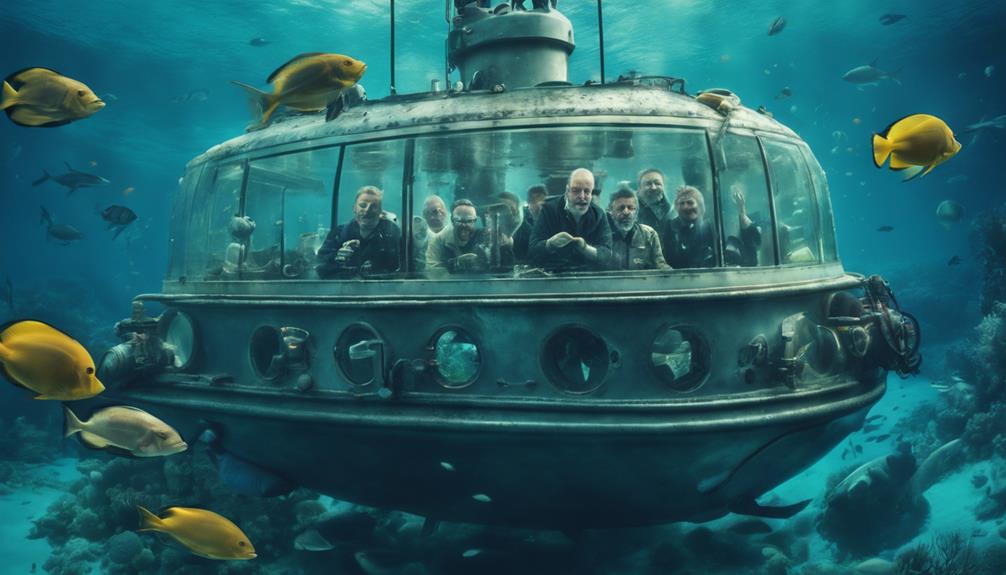
As you explore the public's response to Don Walsh's achievements, you'll notice a wave of viral tweets celebrating his legacy.
Experts have published numerous articles praising his groundbreaking contributions to marine science, highlighting their lasting impact.
Additionally, insights from marine policy experts shed light on how Walsh's work continues to influence oceanic research and exploration today.
Viral Tweets Celebrating His Legacy
Tributes poured in on social media, showcasing the profound impact Walsh had on deep-sea exploration and inspiring future generations of ocean enthusiasts. Many users highlighted Don Walsh's groundbreaking dive to the Mariana Trench, emphasizing how it not only set a record but also opened the door for understanding the mysteries of ocean trenches. His commitment to ocean exploration resonated deeply, with experts praising his role as a mentor, guiding young marine scientists and researchers.
Viral tweets celebrated Walsh's advocacy for manned missions, noting that his approach complemented unmanned vehicles in ocean research. This perspective sparked discussions about the future of deep-sea exploration technology and the importance of human involvement in understanding our oceans.
Moreover, people reflected on Walsh's character, recalling his humility and kindness, which inspired countless explorers to pursue careers in oceanography and marine conservation. The public reaction included calls for honoring his legacy by advocating for increased funding for ocean research and promoting ocean literacy.
These heartfelt messages not only acknowledged Walsh's contributions but also reinforced the need to protect and explore the world's oceans, in line with his lifelong commitment.
Publications Praising His Achievements
Numerous publications have lauded Don Walsh's groundbreaking achievements, emphasizing his pivotal role in advancing marine science and exploration. His historic dive to Challenger Deep in 1960 not only expanded the boundaries of human exploration but also garnered recognition from President Dwight D. Eisenhower, who awarded him the Legion of Merit. Over 200 publications document Walsh's contributions, showcasing his expertise and influence within the scientific community.
Walsh's dedication to mentoring and advocating for ocean education has inspired countless oceanographers, earning him admiration from educational institutions and his peers. His collaborative efforts with filmmaker James Cameron during the DEEPSEA CHALLENGE mission in 2012 were celebrated as a significant step forward in deep-sea exploration. This partnership highlighted the essential role of human presence in ocean research, further solidifying Walsh's impact on the field.
Moreover, the Walsh Spur mountain ridge in Antarctica stands as a symbol of the lasting influence of his explorations on both science and geography. Through these accolades and recognitions, it's clear that Walsh's achievements have left an indelible mark on marine exploration, inspiring future generations to continue his legacy.
Marine Policy Expert Insights
Don Walsh's insights on marine policy have sparked meaningful discussions about the crucial role of human involvement in deep-sea research, reinforcing the need for innovative approaches alongside technology. His advocacy emphasizes that while unmanned vehicles play an essential role, human presence is equally important for fostering a deeper understanding of marine ecosystems.
Walsh's work has influenced various marine programs, pushing for policies that prioritize sustainable practices and ocean conservation. By highlighting the importance of ocean literacy, he encourages future generations to engage actively with marine science. His extensive publications serve as a foundation for discussions on the importance of integrating human expertise into technological advancements in marine research.
Moreover, Walsh's mentorship of young explorers showcases the value of curiosity and hands-on experience, essential elements in shaping effective marine policy. As public awareness grows, so does support for initiatives that blend human insight with machine capabilities, driving a more thorough approach to ocean exploration.
His contributions have undeniably paved the way for a future where marine policy evolves to meet the challenges of ocean conservation while embracing the depths of human knowledge and experience.
Broader Implications
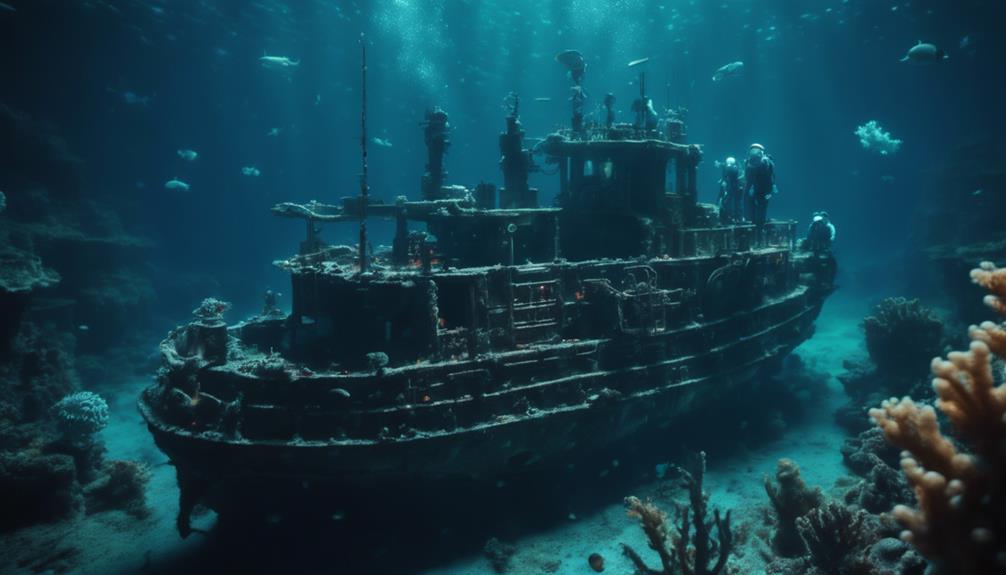
Walsh's groundbreaking journey opened doors to advancements in submersible technology, making deep-sea exploration more accessible.
You'll see how this progress fuels underwater habitat research initiatives that aim to reveal the mysteries of marine life.
Plus, his work emphasizes the importance of environmental stewardship and education, urging everyone to take action in protecting our oceans.
Advancements in Submersible Technology
Advancements in submersible technology have opened up new frontiers in ocean exploration, allowing you to uncover the mysteries of the deep like never before. The evolution from the Trieste, with its simple pressure-resistant design, to the sophisticated DEEPSEA CHALLENGER highlights this progress. The DEEPSEA CHALLENGER, piloted by James Cameron in 2012, introduced features like multi-function cameras and advanced lighting, transforming how you explore the ocean's depths.
These technological improvements have made it possible to reach the deepest place on Earth, the Mariana Trench, where pressures exceed 1,000 times that of sea level. Modern submersibles can withstand these extreme conditions, enabling missions that were once deemed impossible. With each dive, you gain a better understanding of marine biodiversity and geology, which is essential for future discoveries and ocean conservation efforts.
As submersible designs continue to evolve, you're not only expanding your knowledge of the ocean but also fostering greater awareness of its significance. The insights gained from these advancements pave the way for sustainable practices that protect our planet's critical marine ecosystems.
Underwater Habitat Research Initiatives
Exploring underwater habitats reveals crucial insights into the effects of extreme ocean environments on marine life and human activities. Don Walsh's research initiatives have been key in understanding how these habitats function and thrive under such conditions.
By conducting deep-sea dives, Walsh developed technologies that support long-term human presence in underwater habitats, which is essential for future exploration missions. His expeditions have provided critical data on marine ecosystems, leading to the establishment of guidelines for underwater habitat conservation and management.
Walsh has always advocated for collaborative research, integrating manned and unmanned exploration methods. This approach maximizes data collection and enhances our understanding of complex oceanic environments.
Thanks to Walsh's legacy, a new generation of scientists and explorers is inspired to explore deeper into underwater habitat studies. This growing interest fosters greater awareness of the ecological significance of these environments, highlighting the need for sustainable practices in ocean exploration.
As you consider the broader implications of Walsh's work, remember that understanding underwater habitats not only benefits marine life but also informs human activities, ensuring a harmonious relationship with our oceans.
Environmental Stewardship and Education
Environmental stewardship and education play essential roles in shaping the next generation of marine scientists and advocates who'll protect our oceans. Don Walsh recognized this vital link, emphasizing the need for robust ocean education to foster a deep understanding of marine ecosystems. By serving as the Dean of Marine Programs at USC, he influenced marine policy and inspired countless students to engage in ocean research.
Walsh's extensive contributions, including over 200 publications on marine exploration and history, raised awareness about marine conservation and the significance of deep-sea environments. He didn't just share knowledge; he actively mentored young explorers, equipping them with insights and experiences vital for tackling the challenges of deep-sea exploration.
Moreover, as a founder of International Maritime, Walsh championed sustainable marine practices and technological advancements, highlighting the importance of responsible stewardship of ocean resources. By encouraging future generations to pursue marine science, he laid a foundation for a more sustainable future.
Ultimately, your role in ocean education and conservation can be pivotal in ensuring that our oceans are protected for years to come.
Frequently Asked Questions
What Did Don Walsh and Jacques Piccard See?
During their historic dive, you'd see the stirred-up sediment, limiting visibility, and encounter strange life forms like shrimp-like creatures. You'd also notice the immense pressure, evident from the cracked acrylic window of the bathyscaphe.
What Are Some Fun Facts About Don Walsh?
You'll find it fascinating that Don Walsh co-piloted the first descent to the Mariana Trench, holds a PhD in oceanography, and advised on James Cameron's DEEPSEA CHALLENGE, showcasing his deep-sea exploration expertise.
Who Was the Man Who Reached the Deepest Place on Earth?
The man who reached the deepest place on Earth is Don Walsh. Alongside Jacques Piccard, he made history by diving to Challenger Deep in 1960, achieving a remarkable feat in deep-sea exploration that still inspires today.
Who Has Dived the Deepest in the Ocean?
You'll find that Victor Vescovo currently holds the record for the deepest plunge in the ocean, reaching 10,927 meters in 2019 during the Five Deeps Expedition, showcasing advancements in deep-sea exploration technology.
Conclusion
In exploring Don Walsh's remarkable discoveries, you can't help but appreciate the profound impact he's had on our understanding of the ocean's depths.
His adventures not only inspire curiosity but also highlight the importance of preserving our planet's mysteries.
As you reflect on his contributions, consider how exploration fuels innovation and conservation efforts, shaping a better future for generations to come.
Walsh's legacy reminds us that there's still so much to uncover beneath the waves.

